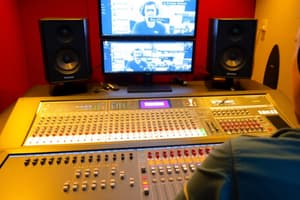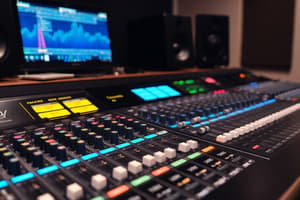Podcast
Questions and Answers
What is the purpose of buses in the Behringer X32 mixer?
What is the purpose of buses in the Behringer X32 mixer?
- To adjust channel equalization
- To separate audio outputs like in-ear monitors (correct)
- To control the main mix levels
- To switch between channel inputs
How do you switch to a different channel on the Behringer X32?
How do you switch to a different channel on the Behringer X32?
- By selecting the desired channel directly (correct)
- By using the sends on fader function
- By adjusting the bus channels
- By adjusting the main mix levels
What is the range of the sliders for adjusting main mix levels?
What is the range of the sliders for adjusting main mix levels?
- -20 to +20 decibels
- 0 to +60 decibels
- -10 to +10 decibels
- 0 to -60 decibels (correct)
What is the function of the 'sends on fader' button?
What is the function of the 'sends on fader' button?
What is the purpose of channels 7-16 on the Behringer X32?
What is the purpose of channels 7-16 on the Behringer X32?
What is the advantage of using in-ear monitors?
What is the advantage of using in-ear monitors?
How do you return to the main mix after adjusting the monitor mix?
How do you return to the main mix after adjusting the monitor mix?
What is the purpose of aux channels on the Behringer X32?
What is the purpose of aux channels on the Behringer X32?
Flashcards are hidden until you start studying
Study Notes
Behringer X32 Overview
- Organization of the mixer is divided into equalization, main mix, and buses for sound routing.
- Buses allow separate audio outputs like in-ear monitors, which differ from the house mix.
Main Mix and Channels
- Main mix channels are labeled with names such as Nicol, Jane, and Diane for easy identification.
- Channel 1 through 16 corresponds to the praise band; channels 7 through 16 are specifically for these instruments.
- Adjusting house mix levels can be done with sliders, with a range from 0 to -60 decibels to mute channels.
Channel Switching
- Switching channels is achieved by selecting the desired channel directly, which will change the input source displayed.
- Handheld microphones and specific performers are assigned to channels for clarity.
Monitor Mix Configuration
- Important function: the "sends on fader" button which controls what is heard in the in-ear monitors.
- Selecting the correct bus before adjusting channels ensures the intended mix is modified for the monitors.
Volume Balancing
- In-ear monitors allow for lower volume of instruments compared to vocals, aiding performers in hearing themselves better.
- Adjusting levels for individuals in the monitors can be done by selecting bus channels and using the sends on fader function.
Returning to Main Mix
- After adjustments to the monitor mix, returning to the main mix is done by hitting the sends on fader button again.
Additional Features
- Channels 7 through 32 are designated for pastors, facilitating their audio needs.
- Aux channels allow for external audio sources like a computer playing music (e.g., Spotify).
- The main mix channel audio is what the house and livestream audiences hear, ensuring consistency in sound output.
Behringer X32 Overview
- Mixer organization includes equalization, main mix, and buses for effective sound routing.
- Buses provide separate audio outputs such as in-ear monitors, distinct from the main house mix.
Main Mix and Channels
- Main mix channels are easily identifiable with names like Nicol, Jane, and Diane.
- Channels 1 to 16 are assigned to the praise band, with channels 7 to 16 specifically for instruments.
- House mix levels are adjusted using sliders, which operate within a range of 0 to -60 decibels for muting.
Channel Switching
- Channel selection changes the displayed input source for clarity and control.
- Handheld microphones and individual performers are assigned specific channels for easy management.
Monitor Mix Configuration
- The "sends on fader" button is crucial for controlling what performers hear in their in-ear monitors.
- Proper bus selection is essential before modifying channels to ensure the correct monitor mix.
Volume Balancing
- In-ear monitors allow instruments to play at lower volumes relative to vocals, improving vocal clarity for performers.
- Individual monitor levels can be adjusted by selecting bus channels through the sends on fader function.
Returning to Main Mix
- To return to the main mix after monitor adjustments, simply press the sends on fader button again.
Additional Features
- Channels 7 to 32 are allocated for pastors, catering to their specific audio requirements.
- Aux channels can connect external audio sources like a computer for playback (e.g., Spotify).
- The main mix channel audio serves both the house and livestream audiences, ensuring uniform sound quality.
Studying That Suits You
Use AI to generate personalized quizzes and flashcards to suit your learning preferences.




